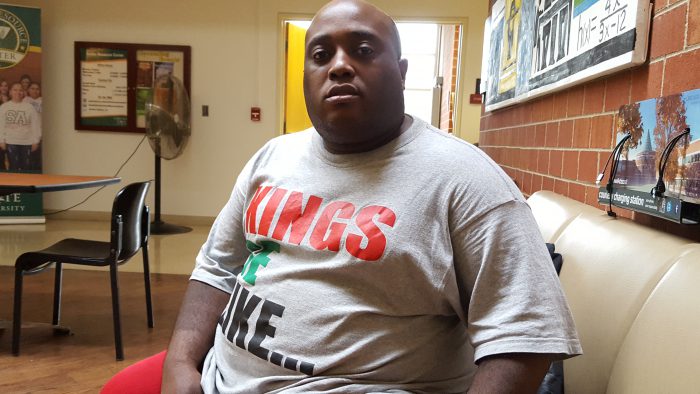If you have been recently perusing social media and blog sites, there is a good chance that you have encountered “#MeToo.” The hashtag, created by social activist Tarana Burke and popularized on Twitter by famous actress Alyssa Milano, is a call for women to publicize their survivor stories of misogyny and rape culture to challenge both. Since this call, many of Hollywood’s notable men have been exposed as engaging in sexual predatory behavior and as rapists.

But “#MeToo” has not empowered only women.
Chicago State University student Omar-Karim Strong, 40, recently posted a Facebook status detailing his survivor story that was caused by the hands of a schoolmate.
“What inspired me was going on Facebook and seeing all these stories,” said Strong.
“I should share my story. I’m at a point where I feel that my story needs to be heard. I’m not riddled with shame to tell it.”
Strong’s story stems from a history of traumatic childhood experiences. At the age of 13, before the incident, his soon-to-be abuser constantly bullied him. The violator, a child himself, would feign kindness to Strong in order to continue violent behavior. Strong described his younger self as viewed as “weak” and “too kind” by other kids growing up on the West Side of Chicago.
Strong says, “It was about power. As I look back on my experiences with this guy, his bullying, it was all about power. I was 13 when it happened. He had me in the hallway of the building that I grew up in. He was trying to gain some control over me, some type of power. He asked me to proceed to…but I said no. But then I was threatened with physical harm. I was extremely afraid. Instead of being dead, I went ahead and did it even though I didn’t want to.”
Strong’s story broadens the general scope of #MeToo narratives. Strong is male and an adolescent abused him. Today, much of the conversation on sexual violence ignores boys harming boys. Strong believes that more male victims do not come forward because of how society views gender.
“We’re viewed as big, strong, and tough,” says Strong. “That’s not even the reality. We look at men and boys as these hardened steel machines––that we’re invincible to situations like these. I grew up in an era where this was seen as invalid.”
According to the National Sexual Violence Resource Center, 1 in 71 men will be raped at some point in their lives but only 63 percent of victims report their rape to authorities. For Strong, disclosing his story was a challenging thought; he waited 10 years, when he was in college, before revealing his assault.
“It was just really heavy on my mind. The first person I told was a college roommate. I had an intention on just getting it out there,” details Strong.
Survivors of sexual violence may suffer a variety of traumas stemming from the event. Strong says rape not only caused him to have anxiety during sexual intercourse for years, but it also pushed him to seek solitude in isolation.
“I stayed to myself and was very distrusting of those around me. For years, I had trouble taking down the wall I built around myself.”
#MeToo has stretched beyond a social media trend. For people like Strong, it is a cathartic symbol that enables impacted voices to be heard loudly. With media empowering new stories everyday, Strong hopes men do more work to decrease sexual violence.
“There needs to be more dialogue. Everyone talks about gun violence but not this. Men need to listen and know that there are resources out there. I think it’s a process. Society is a work in progress. People still have these stigmas that force others to stay silent.”